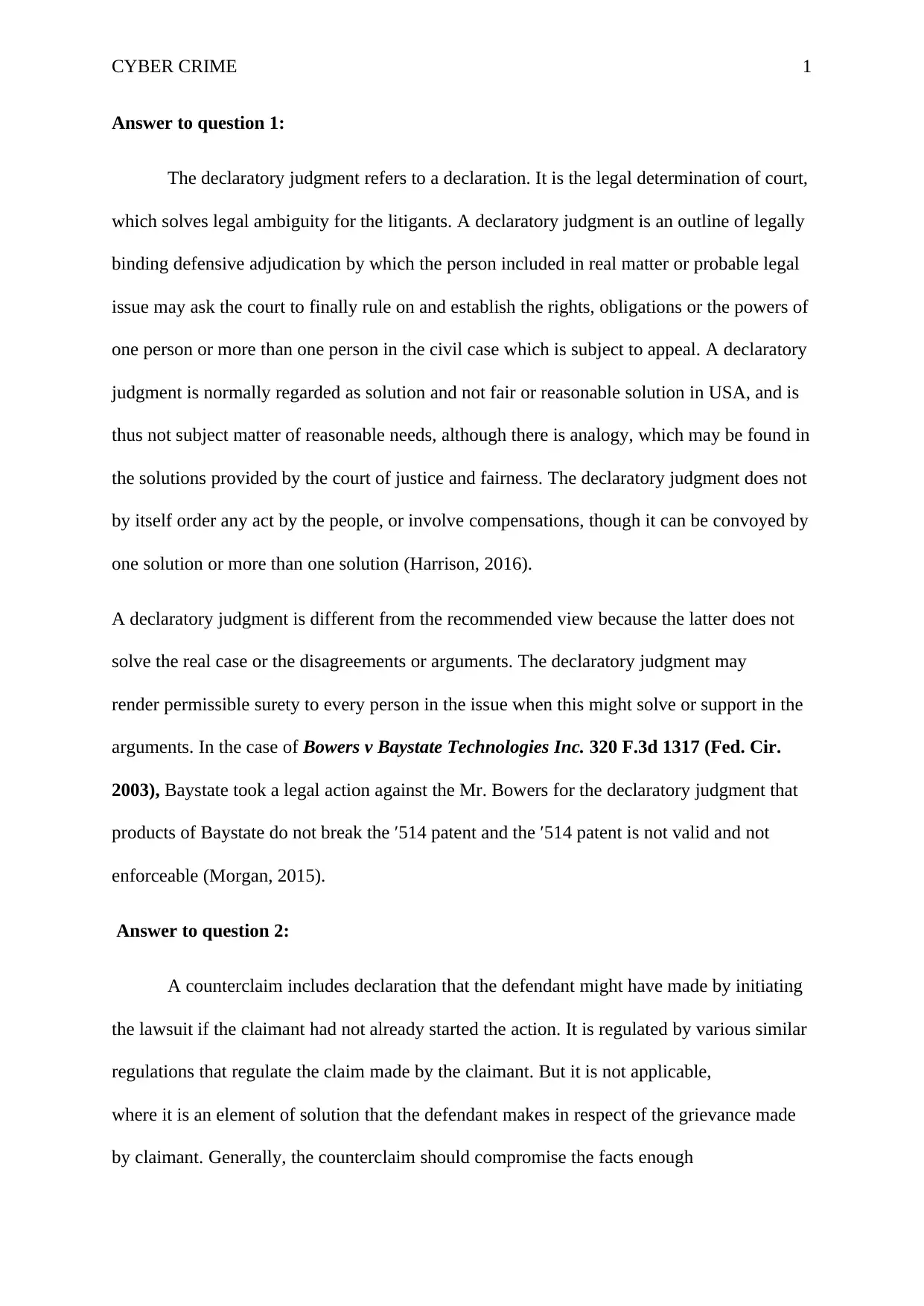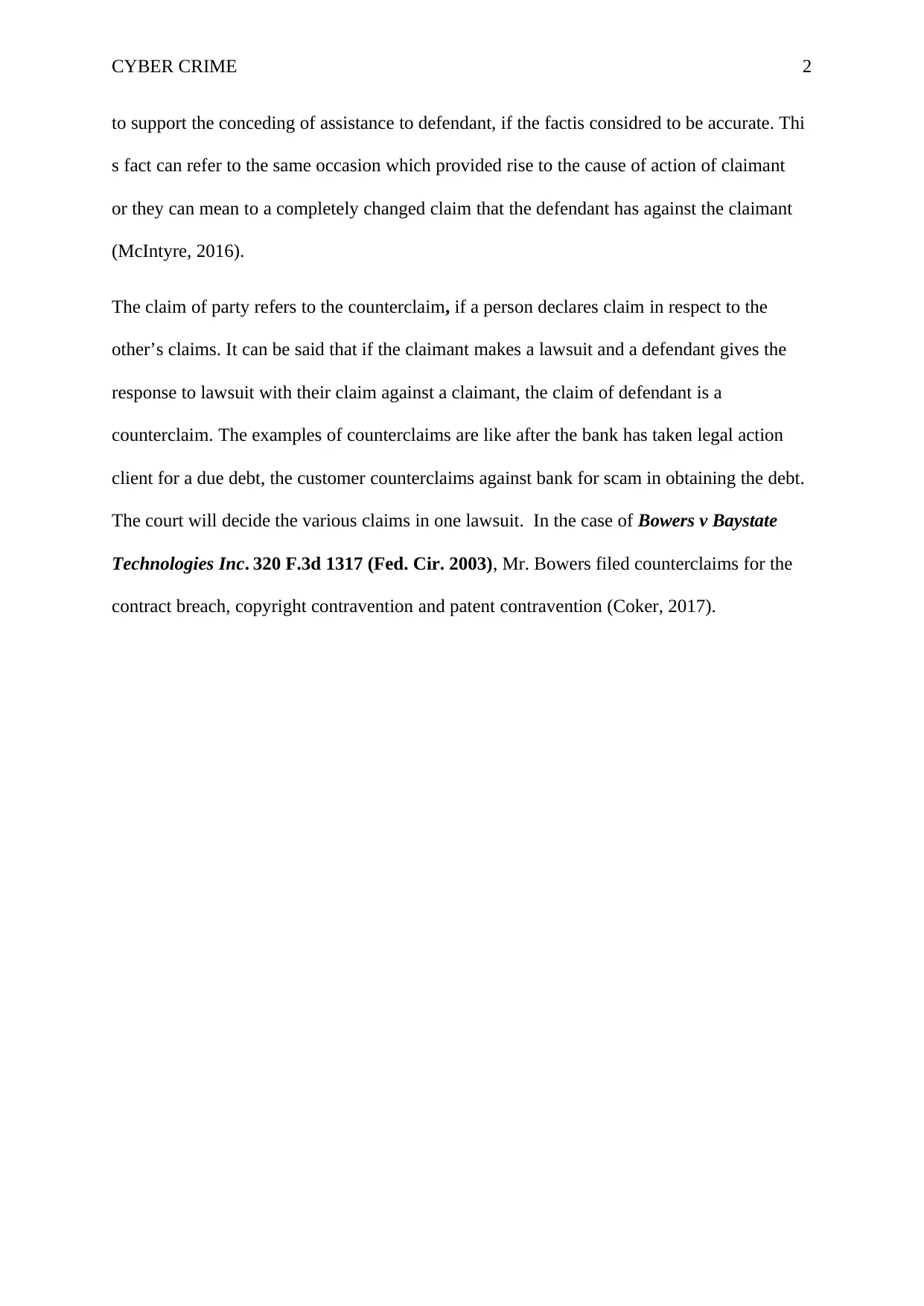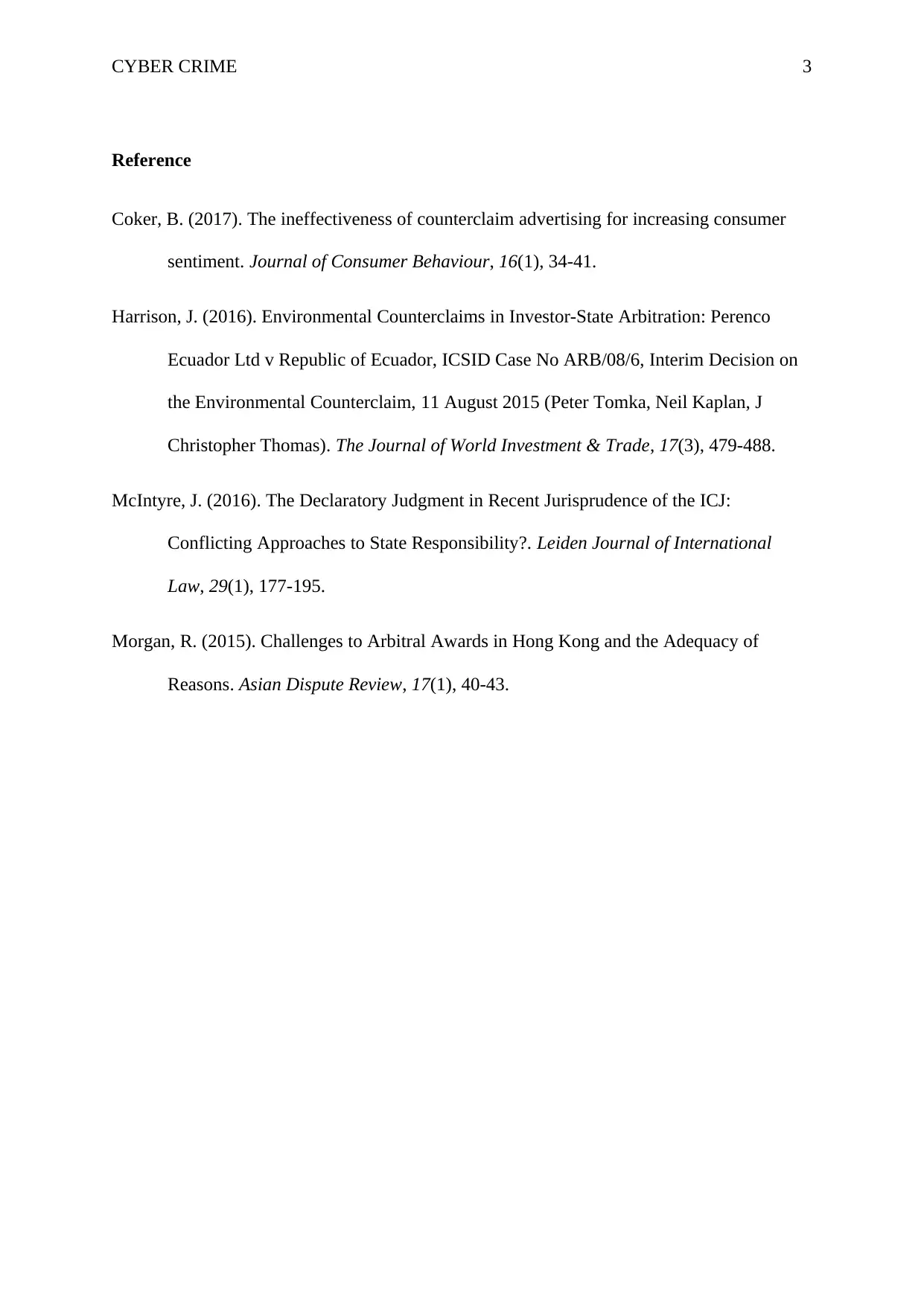Understanding Declaratory Judgment and Counterclaim in Cyber Crime Cases
VerifiedAdded on 2023/06/03
|4
|743
|364
AI Summary
This article explains the concept of declaratory judgment and counterclaim in cyber crime cases. It defines declaratory judgment as a legal determination of court that solves legal ambiguity for the litigants. It also explains counterclaim as a declaration that the defendant might have made by initiating the lawsuit if the claimant had not already started the action.
Contribute Materials
Your contribution can guide someone’s learning journey. Share your
documents today.

Running head: CYBER CRIME 0
CYBER CRIME
SEPTEMBER 26, 2018
STUDENT DETAILS:
CYBER CRIME
SEPTEMBER 26, 2018
STUDENT DETAILS:
Secure Best Marks with AI Grader
Need help grading? Try our AI Grader for instant feedback on your assignments.

CYBER CRIME 1
Answer to question 1:
The declaratory judgment refers to a declaration. It is the legal determination of court,
which solves legal ambiguity for the litigants. A declaratory judgment is an outline of legally
binding defensive adjudication by which the person included in real matter or probable legal
issue may ask the court to finally rule on and establish the rights, obligations or the powers of
one person or more than one person in the civil case which is subject to appeal. A declaratory
judgment is normally regarded as solution and not fair or reasonable solution in USA, and is
thus not subject matter of reasonable needs, although there is analogy, which may be found in
the solutions provided by the court of justice and fairness. The declaratory judgment does not
by itself order any act by the people, or involve compensations, though it can be convoyed by
one solution or more than one solution (Harrison, 2016).
A declaratory judgment is different from the recommended view because the latter does not
solve the real case or the disagreements or arguments. The declaratory judgment may
render permissible surety to every person in the issue when this might solve or support in the
arguments. In the case of Bowers v Baystate Technologies Inc. 320 F.3d 1317 (Fed. Cir.
2003), Baystate took a legal action against the Mr. Bowers for the declaratory judgment that
products of Baystate do not break the ′514 patent and the ′514 patent is not valid and not
enforceable (Morgan, 2015).
Answer to question 2:
A counterclaim includes declaration that the defendant might have made by initiating
the lawsuit if the claimant had not already started the action. It is regulated by various similar
regulations that regulate the claim made by the claimant. But it is not applicable,
where it is an element of solution that the defendant makes in respect of the grievance made
by claimant. Generally, the counterclaim should compromise the facts enough
Answer to question 1:
The declaratory judgment refers to a declaration. It is the legal determination of court,
which solves legal ambiguity for the litigants. A declaratory judgment is an outline of legally
binding defensive adjudication by which the person included in real matter or probable legal
issue may ask the court to finally rule on and establish the rights, obligations or the powers of
one person or more than one person in the civil case which is subject to appeal. A declaratory
judgment is normally regarded as solution and not fair or reasonable solution in USA, and is
thus not subject matter of reasonable needs, although there is analogy, which may be found in
the solutions provided by the court of justice and fairness. The declaratory judgment does not
by itself order any act by the people, or involve compensations, though it can be convoyed by
one solution or more than one solution (Harrison, 2016).
A declaratory judgment is different from the recommended view because the latter does not
solve the real case or the disagreements or arguments. The declaratory judgment may
render permissible surety to every person in the issue when this might solve or support in the
arguments. In the case of Bowers v Baystate Technologies Inc. 320 F.3d 1317 (Fed. Cir.
2003), Baystate took a legal action against the Mr. Bowers for the declaratory judgment that
products of Baystate do not break the ′514 patent and the ′514 patent is not valid and not
enforceable (Morgan, 2015).
Answer to question 2:
A counterclaim includes declaration that the defendant might have made by initiating
the lawsuit if the claimant had not already started the action. It is regulated by various similar
regulations that regulate the claim made by the claimant. But it is not applicable,
where it is an element of solution that the defendant makes in respect of the grievance made
by claimant. Generally, the counterclaim should compromise the facts enough

CYBER CRIME 2
to support the conceding of assistance to defendant, if the factis considred to be accurate. Thi
s fact can refer to the same occasion which provided rise to the cause of action of claimant
or they can mean to a completely changed claim that the defendant has against the claimant
(McIntyre, 2016).
The claim of party refers to the counterclaim, if a person declares claim in respect to the
other’s claims. It can be said that if the claimant makes a lawsuit and a defendant gives the
response to lawsuit with their claim against a claimant, the claim of defendant is a
counterclaim. The examples of counterclaims are like after the bank has taken legal action
client for a due debt, the customer counterclaims against bank for scam in obtaining the debt.
The court will decide the various claims in one lawsuit. In the case of Bowers v Baystate
Technologies Inc. 320 F.3d 1317 (Fed. Cir. 2003), Mr. Bowers filed counterclaims for the
contract breach, copyright contravention and patent contravention (Coker, 2017).
to support the conceding of assistance to defendant, if the factis considred to be accurate. Thi
s fact can refer to the same occasion which provided rise to the cause of action of claimant
or they can mean to a completely changed claim that the defendant has against the claimant
(McIntyre, 2016).
The claim of party refers to the counterclaim, if a person declares claim in respect to the
other’s claims. It can be said that if the claimant makes a lawsuit and a defendant gives the
response to lawsuit with their claim against a claimant, the claim of defendant is a
counterclaim. The examples of counterclaims are like after the bank has taken legal action
client for a due debt, the customer counterclaims against bank for scam in obtaining the debt.
The court will decide the various claims in one lawsuit. In the case of Bowers v Baystate
Technologies Inc. 320 F.3d 1317 (Fed. Cir. 2003), Mr. Bowers filed counterclaims for the
contract breach, copyright contravention and patent contravention (Coker, 2017).

CYBER CRIME 3
Reference
Coker, B. (2017). The ineffectiveness of counterclaim advertising for increasing consumer
sentiment. Journal of Consumer Behaviour, 16(1), 34-41.
Harrison, J. (2016). Environmental Counterclaims in Investor-State Arbitration: Perenco
Ecuador Ltd v Republic of Ecuador, ICSID Case No ARB/08/6, Interim Decision on
the Environmental Counterclaim, 11 August 2015 (Peter Tomka, Neil Kaplan, J
Christopher Thomas). The Journal of World Investment & Trade, 17(3), 479-488.
McIntyre, J. (2016). The Declaratory Judgment in Recent Jurisprudence of the ICJ:
Conflicting Approaches to State Responsibility?. Leiden Journal of International
Law, 29(1), 177-195.
Morgan, R. (2015). Challenges to Arbitral Awards in Hong Kong and the Adequacy of
Reasons. Asian Dispute Review, 17(1), 40-43.
Reference
Coker, B. (2017). The ineffectiveness of counterclaim advertising for increasing consumer
sentiment. Journal of Consumer Behaviour, 16(1), 34-41.
Harrison, J. (2016). Environmental Counterclaims in Investor-State Arbitration: Perenco
Ecuador Ltd v Republic of Ecuador, ICSID Case No ARB/08/6, Interim Decision on
the Environmental Counterclaim, 11 August 2015 (Peter Tomka, Neil Kaplan, J
Christopher Thomas). The Journal of World Investment & Trade, 17(3), 479-488.
McIntyre, J. (2016). The Declaratory Judgment in Recent Jurisprudence of the ICJ:
Conflicting Approaches to State Responsibility?. Leiden Journal of International
Law, 29(1), 177-195.
Morgan, R. (2015). Challenges to Arbitral Awards in Hong Kong and the Adequacy of
Reasons. Asian Dispute Review, 17(1), 40-43.
1 out of 4
Your All-in-One AI-Powered Toolkit for Academic Success.
+13062052269
info@desklib.com
Available 24*7 on WhatsApp / Email
![[object Object]](/_next/static/media/star-bottom.7253800d.svg)
Unlock your academic potential
© 2024 | Zucol Services PVT LTD | All rights reserved.